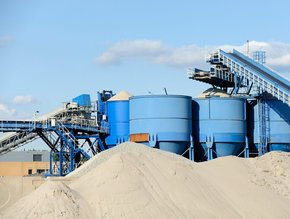Cement industry aspires to reduce Co2 emissions 20-25% by 2030

The cement industry is calling for a long-term policy to help drop emissions by 20-25% by 2030. The Cement Sustainability Initiative (CSI) of the World Business Council for Sustainable Development (WBCSD) calls for an international CO2 policy framework and the removal of existing barriers in order to unlock the sector’s full reduction potential.
Peter Bakker, President and CEO of WBCSD, said: “Cement production accounts for approximately 5% of worldwide man-made CO2 emissions. This collective effort by the cement industry to mitigate its emissions is highly encouraging and showcases the importance of leadership and collaboration in making the transition to a low carbon economy.
“These business measures can only achieve their full potential if backed by the right policy frameworks and financial incentives. We count on the support of policymakers worldwide and the financial community in removing the barriers to scale up.”
The Low Carbon Technology Partnership initiative (LCTPi) is a group of businesses dedicated to reducing these emissions and they are now ready to move towards implementation. There are many ways to reduce emissions but financial and political constraints often hold businesses back. The whole private sector needs to be involved in order to make the most of the technology that’s already there to hit reduction targets.
The LCTPi Cement report identifies a range of actions that tackle emissions of the sector, including expanding the use of alternative fuels and cement components, developing new low carbon cements, looking into avoided emissions in the use phase of concrete as a sustainable building material and exploring novelties in the production process.
Eric Olsen, CEO of LafargeHolcim said: "Since 2001 the cement sector has demonstrated its ability to make progress on mitigating its impact on climate change. The LCTPi provides additional opportunities to accelerate these efforts and widen engagement through actions by all members of the industry, together with other stakeholders, to overcome barriers and achieve performance matching the best in the sector.”
List of companies supporting the Action Plan:
- Cementos Argos
- CEMEX
- CRH
- Dalmia Cement
- GCC
- HeidelbergCement
- InterCement
- Italcementi Group
- LafargeHolcim
- SCG Cement
- Secil
- Shree Cement
- Titan
- UltraTech Cement
- Votorantim Cimentos
- West China Cement
Engaging the building and infrastructure value chains to reduce cement’s footprint will further contribute to the use of concrete as a sustainable and resilient construction solution.
Follow @ConstructionGL
- Cement Industry key Target of $20bn US Decarbonisation PlanSustainability & Green Building
- CLC aim to reduce diesel on UK sites by 78% before 2035Facilities Management
- Recycled nappies – the next big material in home building?Built Environment
- Zero emission public transport in Genoa, ItalyConstruction Projects






